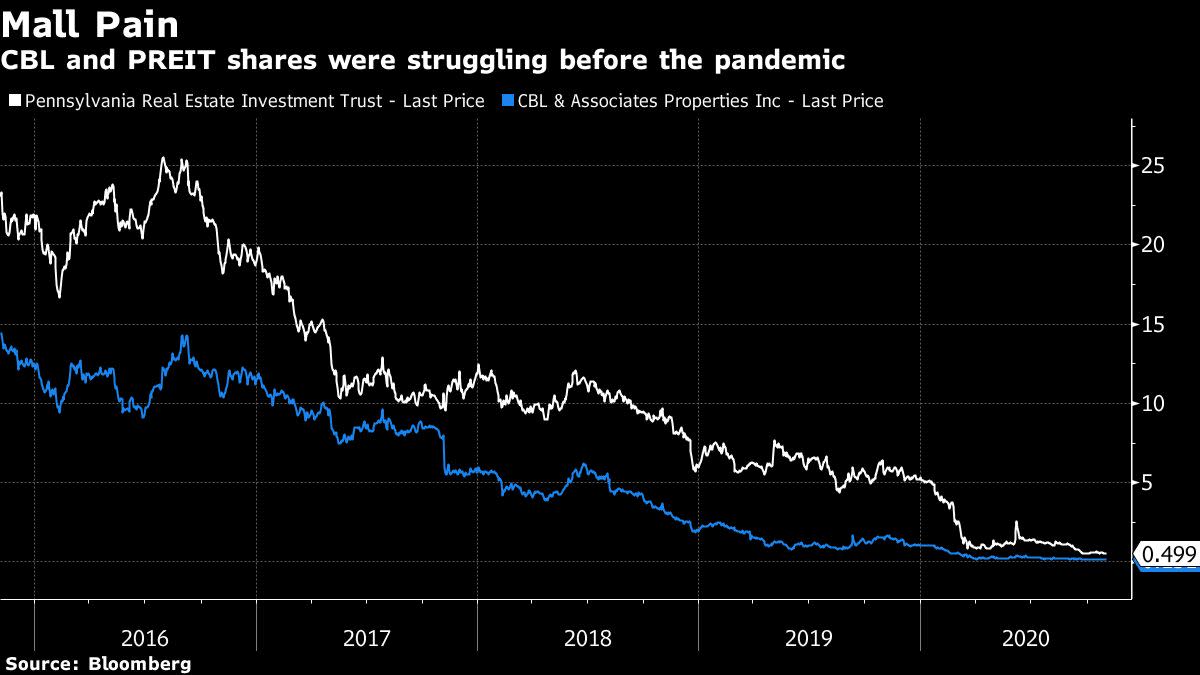Malls Dragged Into Bankruptcy by Carnage at Retail Tenants

(Bloomberg) — America’s ailing malls suffered a pair of body blows over the weekend as two major landlords followed their ever-growing list of bankrupt tenants into Chapter 11 protection.
Pennsylvania Real Estate Investment Trust and CBL & Associates Properties Inc. sought protection from creditors Sunday, citing pandemic-induced pressures on their tenants and, in turn, themselves. Together the two REITs account for some 87 million square feet of real estate across the U.S., according to court papers.
The pandemic worsened an already dire situation for brick-and-mortar retailers, with a steady stream of chains falling victim as their customers shifted to online shopping. J.C. Penney Co., J. Crew Group and the owner of Ann Taylor are among the dozens of chains that have sought court protection since Covid-19 lockdowns throttled in-store shopping this year.
That’s an even bigger problem for the likes of PREIT and CBL, which own less productive malls than rivals such as Simon Property Group and Macerich Co., according Bloomberg Intelligence analyst Lindsay Dutch.
“There’s too much retail real estate in the U.S.,” said Dutch, a REIT equity analyst. “Retailers continue to reduce their store footprints, and while brick and mortar is here to stay, the focus is on high-quality locations.”
The Chapter 11 filing doesn’t necessarily mean the malls are closing. Instead, it gives their owners time to work out a plan to turn the business around and repay creditors.
CBL, based in Chattanooga, counts 107 properties in 26 states in its portfolio, including enclosed malls, outlets and open-air retail centers, according to a company statement. Philadelphia-based PREIT owns malls in Pennsylvania, New Jersey, Virginia, Maryland and Michigan, according to its website.
B Class
Many of their properties are known in the industry parlance as B-class malls, which bring in fewer sales per square foot than their better-placed peers. They may be located outside major metropolitan areas or upscale regions, making them vulnerable as middle-class customers struggle to make ends meet, and they were hit hard by the pullback of anchor stores like J.C. Penney and Sears.
Just in 2020, more than 30 of CBL’s retail tenants went bankrupt, according to court papers filed by CBL in Houston on Monday. The resulting closures cut deep into revenue, which was also hurt by rent deferrals and other types of concessions for tenants.
The recovery plan envisions giving a 90% ownership stake to holders of CBL’s senior unsecured notes, along with almost $50 million in cash. A 10% stake in the reorganized company would be awarded to current stockholders, which may ease some of the impact on founder and Chairman Charles B. Lebovitz, who ranked as the biggest share owner.
Fresh Cash
The mall owners drummed up support from creditors for restructuring plans prior to their bankruptcy filings, possibly shortening their trips through bankruptcy. PREIT’s plan would, pending court approval, push out debt maturities and bring in $150 million of additional capital.
CBL’s plan would slash debt by $1.5 billion and also extend certain maturities, but the process may not be smooth. The mall company said its bank lenders cut short negotiations, acting “under cover of darkness and asserting a variety of conjured up alleged Events of Default that occurred during the global pandemic.” CBL said it was suing to void those actions.
PREIT, too, faces opposition from a dissenting creditor. An investment firm — Strategic Value Partners LLC — bought up a small piece of PREIT debt in the run-up to its bankruptcy and is the “lone holdout” to its proposed restructuring, Chief Financial Officer Mario Ventresca Jr. said in documents filed Monday in Delaware.
The lender “will almost certainly seek to delay or derail” PREIT’s proposal, Ventresca said. The plan would let stockholders keep their shares, leave trade creditors unimpaired and hand new debt claims to holders of some unsecured PREIT debt, among other things.
Strategic Value Partners instead proposed handing all the equity to unsecured lenders, but that plan would probably lead to a legal fight with other lenders, undoing support PREIT worked to build with other creditors, Ventresca said.
Representatives for Strategic Value Partners declined to comment.
(Updates with terms and context surrounding PREIT’s deal beginning in 13th paragraph.)
For more articles like this, please visit us at bloomberg.com
Subscribe now to stay ahead with the most trusted business news source.
©2020 Bloomberg L.P.



